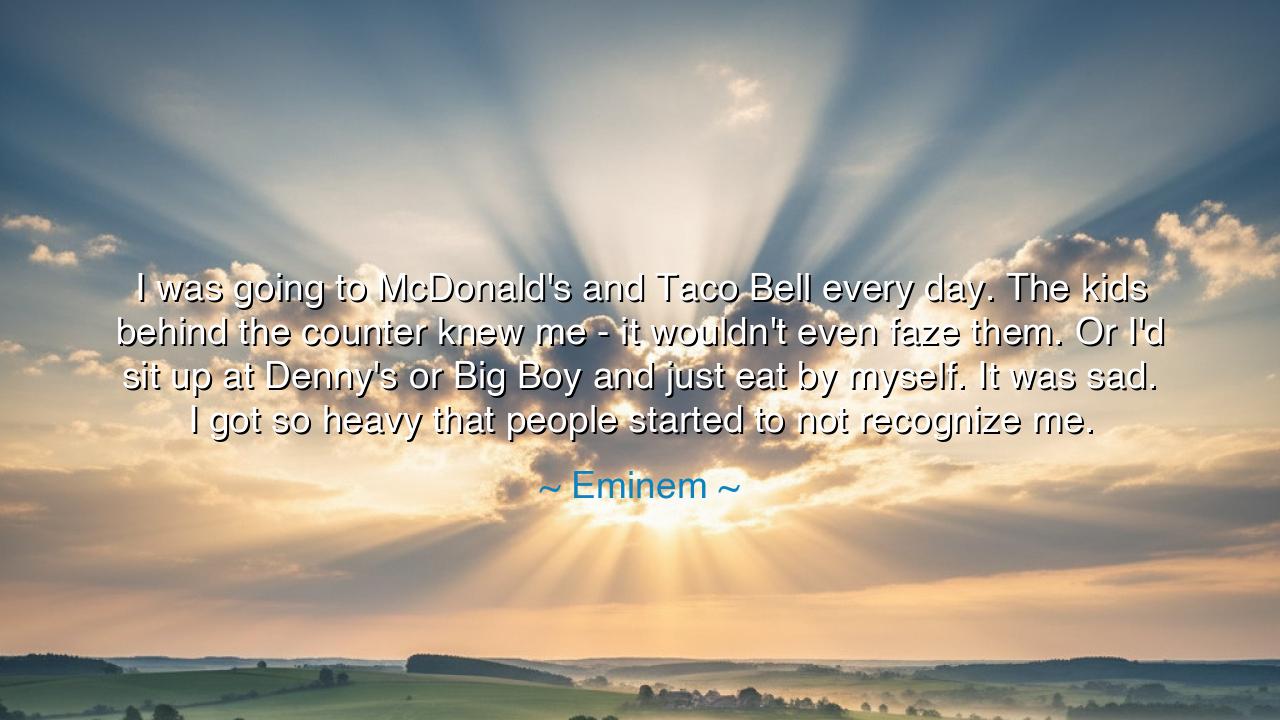
I was going to McDonald's and Taco Bell every day. The kids
I was going to McDonald's and Taco Bell every day. The kids behind the counter knew me - it wouldn't even faze them. Or I'd sit up at Denny's or Big Boy and just eat by myself. It was sad. I got so heavy that people started to not recognize me.






In the confessional words of Eminem, one of the great poets of modern struggle, there lies a truth that cuts to the very core of the human spirit: “I was going to McDonald’s and Taco Bell every day. The kids behind the counter knew me—it wouldn’t even faze them. Or I’d sit up at Denny’s or Big Boy and just eat by myself. It was sad. I got so heavy that people started to not recognize me.” In these lines, stripped of rhythm and rhyme, we hear not the roar of fame, but the whisper of loneliness. It is the voice of a man who has touched glory yet fallen into shadow, who has known applause and then silence, who has been recognized by the world yet estranged from himself.
This moment in Eminem’s life came after the whirlwind of success and the wreckage of addiction. Behind the fame, the awards, and the fierce bravado of his art was a human being broken and adrift. The fast food, the isolation, the endless nights at diners—these were not merely acts of indulgence, but rituals of emptiness. His body grew heavy, but it was the soul that carried the true weight. For when the inner light dims, the spirit often seeks comfort in excess, mistaking consumption for connection, appetite for meaning. And thus he became, as he said, “unrecognizable”—not only to others, but to himself.
The ancients knew this condition well. They called it acedia, the sickness of the soul — a state of weariness, disconnection, and despair. In the monasteries of the desert fathers, monks would speak of days when the heart grew numb, when prayer turned hollow, and the body sought distraction to fill the void of spirit. Like Eminem’s late-night meals beneath the glow of fluorescent lights, they too found themselves haunted by restlessness, seeking solace in anything that could dull the ache of meaning lost. Yet they learned, as all must, that no fullness of the body can cure the hunger of the heart.
Consider the story of King Midas, who, granted the power to turn all he touched into gold, soon found his gift a curse. The food he touched turned to metal; his daughter, his joy, became lifeless in his arms. He starved amid abundance, for he had mistaken wealth for fulfillment. So too do many, in the modern age, chase comfort and pleasure, mistaking consumption for contentment. Eminem’s tale, like Midas’s, is a warning—that excess without purpose becomes its own prison, and that indulgence without love leads to isolation rather than satisfaction.
Yet within his confession there is no vanity, only awakening. When Eminem says, “It was sad,” he speaks not as a victim but as a witness to his own fall. He saw what many never see—that recognition by others means nothing if one ceases to recognize oneself. This is the wisdom of humility: to face one’s brokenness without disguise, to admit that the path to healing begins in self-awareness. It was from this very moment of despair that he began to rise again, reclaiming not just his health but his identity. His art, once born of rage, became tempered by understanding. He learned, as the ancients would say, to balance the body and the soul.
There is a universal lesson in his story. Every human heart knows the temptation of self-neglect — the quiet drift into habits that numb rather than heal. Whether it is food, fame, distraction, or ambition, we all risk becoming strangers to ourselves when we forget our inner purpose. The first step back, as Eminem discovered, is not grand transformation, but recognition: to see what we have become, to name our sorrow, and to begin again with honesty. For only the one who looks into the mirror and admits, “I am lost,” can find the way home.
Thus, the teaching is clear: Guard your spirit as carefully as your body. Feed yourself not only with bread, but with meaning. Seek connection, not distraction; nourishment, not indulgence. When life grows heavy, do not fill the emptiness with noise—sit with it, understand it, and rise from it. The road of healing is long, but every step toward self-knowledge is a step toward peace.
And so, from the quiet confession of a man who once sat alone under the harsh lights of a diner, we receive a timeless truth: that even in our lowest hours, the possibility of renewal waits beside us. Eminem’s words remind us that the human spirit, though burdened by sadness, can always rise again—leaner, wiser, and whole. For to recognize one’s own fall is not defeat; it is the first act of strength, the first glimmer of the soul remembering who it truly is.






AAdministratorAdministrator
Welcome, honored guests. Please leave a comment, we will respond soon